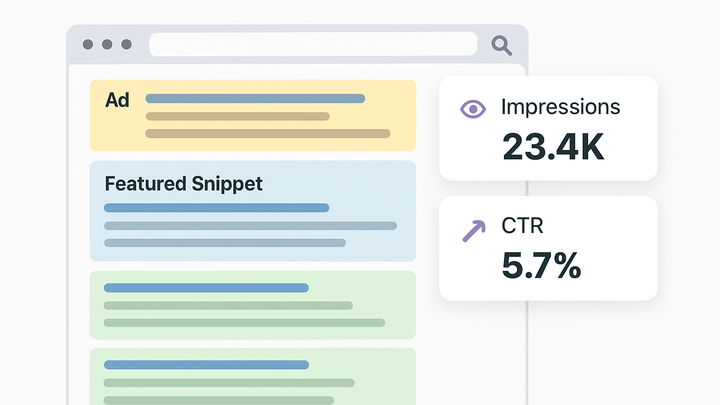Published on 2025-06-26T05:11:31Z
What is SERP? Understanding the Search Engine Results Page
In analytics, SERP stands for Search Engine Results Page, the page displayed by a search engine in response to a user’s query. Understanding SERP performance helps marketers and analysts measure search visibility, user engagement, and traffic quality. Key metrics include impressions, click-through rate (CTR), and average position—data you can track in tools like Google Analytics 4 (GA4) and PlainSignal. PlainSignal offers a cookieless, privacy-focused approach to capture SERP referrals, while GA4 provides deep integration with Google Search Console for query-level insights. By optimizing for SERP features—such as featured snippets, local packs, and rich results—you can boost organic traffic and outshine competitors.
PlainSignal Tracking Snippet Example
<link rel="preconnect" href="//eu.plainsignal.com/" crossorigin />
<script defer data-do="yourwebsitedomain.com" data-id="0GQV1xmtzQQ" data-api="//eu.plainsignal.com" src="//cdn.plainsignal.com/plainsignal-min.js"></script>
Serp
SERP (Search Engine Results Page) is the search engine listing page; metrics like impressions, CTR, and position track organic performance.
Why SERP Matters in Analytics
The SERP is the gateway through which organic and paid search users discover content. Analyzing SERP performance helps you measure visibility, user engagement, and the effectiveness of your SEO and SEM strategies.
-
Measuring visibility
Visibility metrics such as impressions and average position tell you how often and where your pages appear in search results.
-
Impressions
The number of times your page is displayed on the SERP for specific queries.
-
Average position
The mean ranking of your URLs for given search terms across all impressions.
-
-
Understanding click-through rate (ctr)
CTR measures the percentage of SERP impressions that result in clicks, indicating the effectiveness of titles and meta descriptions.
-
Identifying result types
SERPs include various result formats that impact user behavior and click patterns.
-
Organic results
Listings ranked by relevance and SEO factors without paid promotion.
-
Paid ads
Sponsored listings purchased through advertising platforms like Google Ads.
-
Featured snippets
Concise answers pulled from page content and displayed prominently at the top of the SERP.
-
Local packs
Grouped listings of local businesses for geographically relevant searches.
-
Tracking SERP Performance with Analytics Tools
Leverage analytics platforms to capture SERP referral data, visualize trends, and derive actionable insights. Different tools offer unique approaches depending on privacy needs and data depth.
-
Google analytics 4 (GA4)
GA4 automatically categorizes organic search traffic and, when linked to Google Search Console, provides query-level data for impressions, clicks, and positions.
-
Search console integration
Connect GA4 to Search Console to import search query and page performance metrics.
-
Traffic channel reports
Use default channel grouping to analyze organic vs. paid search traffic in GA4 reports.
-
-
PlainSignal (cookieless analytics)
PlainSignal offers a simple, privacy-focused approach for tracking pageviews and referrals without cookies, making it easy to measure SERP traffic in compliance with regulations.
-
Setup snippet
Embed the following code in your HTML head to start cookieless tracking:
<link rel="preconnect" href="//eu.plainsignal.com/" crossorigin /> <script defer data-do="yourwebsitedomain.com" data-id="0GQV1xmtzQQ" data-api="//eu.plainsignal.com" src="//cdn.plainsignal.com/plainsignal-min.js"></script> -
Privacy benefits
No reliance on cookies means automatic compliance with GDPR and CCPA, and reduced consent banner friction.
-
Best Practices for SERP Optimization
Optimizing for SERP involves technical, on-page, and content strategies to improve rankings and click-through rates. Regular monitoring ensures you adapt to search algorithm changes.
-
On-page seo
Craft descriptive titles, compelling meta descriptions, and structured headings to match user intent and targeted keywords.
-
Technical seo
Optimize site speed, mobile usability, and implement structured data to enable rich snippets and faster page indexing.
-
Page load speed
Use tools like Google PageSpeed Insights to minimize load times and improve user experience.
-
Structured data
Implement schema.org markup to unlock rich results, such as FAQs and breadcrumbs.
-
-
Content strategy
Develop high-quality, relevant content that directly answers search queries and earns organic backlinks for authority.
